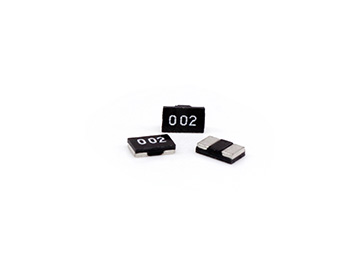Core Application and Scheme Analysis of 0402 Alloy Sampling Resistance in Data Lines
Against the backdrop of the surge in demand for high-speed charging and intelligent control, the precision requirements for current detection and power management in data cable design are increasingly increasing. 0402 alloy resistors have become key components in high-performance data line solutions due to their low resistance, high precision, and miniaturization characteristics. The following analysis will focus on application scenarios, core parameters, selection suggestions, and typical cases to provide reference for project design.
Recommended Walter brand for 0402 alloy resistors used in data cables: Walter Mstc series

1、 Application scenarios of 0402 alloy resistors in data lines
Fast charging protocol support
The data cable supporting fast charging protocols such as PD and QC needs to monitor the current in real time, connect it in series with the main circuit through 0402 alloy resistors (such as 0.005R), accurately sample the current and feedback it to the control chip, dynamically adjust the output power, and avoid overcurrent or overheating risks. For example, fast charging lines above 15W often use alloy resistors with resistance values ranging from 0.005R to 0.05R to achieve milliohm level voltage drop detection.
High power transmission (such as USB-C 100W)
In high current scenarios (above 5A), the low resistance characteristics of 0402 alloy resistors can reduce power loss, and their high power carrying capacity (such as 0.33W packaging) ensures stable operation in high temperature environments. For example, in a laptop charging cable, a 0.005R resistor combined with a current design of 3A or higher can optimize efficiency and reduce heat generation.
Intelligent data cable (with protocol chip)
Intelligent data cables with built-in MCU or protocol chips require precise control of the current path. 0402 alloy resistors are used for current limiting protection or signal conditioning, for example, in the CC pin of Type-C interface, device identification and power negotiation are achieved through resistor configuration.
2、 Core parameter requirements for 0402 alloy resistor
Regarding the data cable solution, the following parameters need to be given special attention:
Low resistance range: 0.0025R (2.5m Ω)~0.05R (50m Ω), such as the 0.005R (5m Ω) model (MSTC0402MW33R005F) in the Huade MSTC series, with an accuracy of ± 1%, suitable for high-precision current detection requirements.
Temperature coefficient (TCR): as low as ± 50ppm/℃~± 150ppm/℃, ensuring stable resistance over a wide temperature range and avoiding detection errors caused by environmental temperature fluctuations.
Power tolerance: Typical power range of 0.25W~0.33W (such as 0402 package), requiring a combination of current density and heat dissipation design. For example, under 5A current, the power loss of a 0.005R resistor is 0.125W, and a 0.33W package should be selected to leave some margin.
Packaging and reliability: The 0402 size (1.0mm × 0.5mm) is compatible with compact PCB layouts, and nickel plated end electrodes enhance soldering reliability. It has also passed certifications such as RoHS and AEC-Q200 (automotive grade).
3、 Selection suggestions and design points
Matching resistance and accuracy
Fast charging scenario: Prioritize selecting a ± 1% precision resistor, such as 0.005R ± 1% (error ± 0.05m Ω), to ensure that the current sampling error is ≤ 2%.
General scenario: It can be relaxed to ± 5%, but the accuracy loss needs to be compensated through redundant design.
Thermal management and layout optimization
Avoid placing resistors near heating elements (such as MOSFETs) and adopt copper plated heat dissipation or increased via heat dissipation design.
The signal routing is short and symmetrical, reducing the impact of parasitic inductance on sampling accuracy.
Certification and Cost Balance
Consumer grade data cables can choose commercial grade resistors (such as the Huade MSTC series), while automotive or industrial grade cables must comply with AEC-Q200 or UL certification.
Thick film resistors can be used for cost sensitive projects, but alloy resistors have more advantages in terms of lifespan and stability.
4、 Typical Case Analysis
Project background: A client needs to develop a USB-C 60W fast charging cable that supports the PD3.0 protocol and has an overcurrent protection threshold of 5A.
Scheme design:
Current sampling resistor: Use Huade 0402 alloy resistor MSTC0402MW33R005F (0.005R ± 1%), combined with differential amplifier to detect voltage drop, to achieve ± 2% current accuracy.
Layout optimization: Resistors are close to the Type-C interface, and Kelvin connection method is used to eliminate the influence of routing resistors.
Test verification: Under the environment of -20 ℃~85 ℃, the current error caused by resistance temperature drift is less than 1.5%, which meets the stability requirements of vehicle specifications.
5、 Technology Trends and Market Directions
High integration: In the future, data cables may integrate 0402 resistors and protocol chips in a sealed solution to reduce PCB area occupation.
Intelligent upgrade: Dynamic power adjustment is achieved through resistors and MCU, such as automatic derating based on cable temperature.
Material innovation: Using manganese copper (MnCu) or nickel chromium alloy (NiCr) to improve the resistance to high temperature and sulfurization, and extend the life of data cables.
0402 alloy resistors have become the core components of high-performance data line design due to their precise current detection capability and compact packaging. In response to the demands for fast charging, high power, and intelligence, it is necessary to comprehensively consider resistance accuracy, temperature drift characteristics, and reliability certification, and optimize layout and heat dissipation solutions based on specific scenarios. 0402 alloy resistors from brands such as Huade and Vishay (such as the 0.005R model) have been validated through mature applications and can effectively improve the safety and efficiency of data cables, helping customers quickly implement their solutions.
